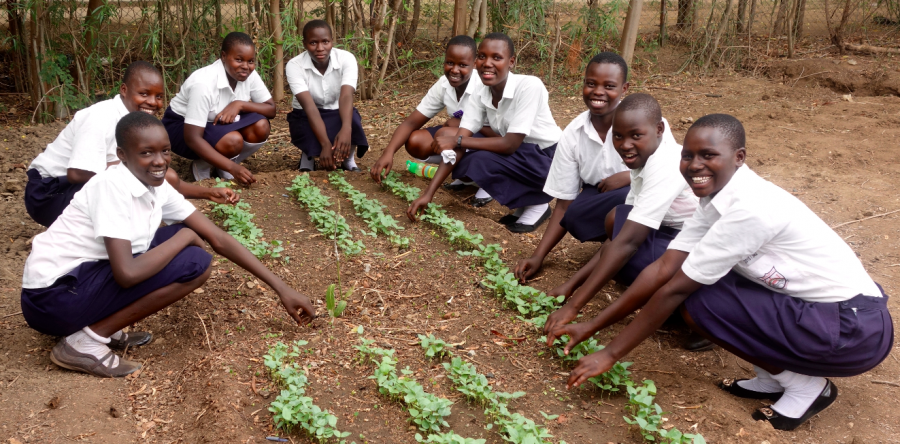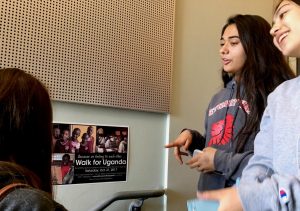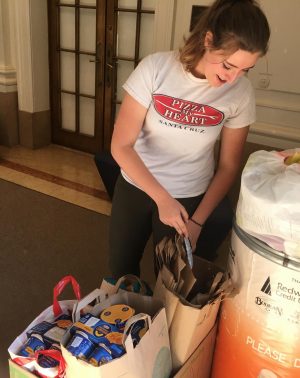Sacred Heart school faces food shortage crisis
Girls from the agricultural club at Kangole Senior Secondary School pose with the beginnings of their greenhouse project. The club is responsible for maintaining the project, which is one of the efforts that the school has initiated in an effort to become self-sustaining.
Maize porridge, tortillas and beans cooked with small amounts of vegetable oil were standard fare at Kangole Senior Secondary School in northeastern Uganda, until the United Nations World Food Programme completely withdrew its support of the Sacred Heart school at the beginning of this month.
Without the aid from the WFP, Kangole SSS may be forced to close before the end of the school year in December, meaning that the graduating girls will miss their government-mandated exams and that hundreds of others will lose the entire year of schooling, only to be sent home to a place where food is already scarce.
“One of the benefits of the feeding programme is that it’s an incentive for parents to send their children to school,” said Sister Irene Cullen, RSCJ, of the Uganda-Kenya Mission Support Office, “and especially girls, because otherwise they’d just stay home and do domestic things.”
Historically, the boarding school relied upon the WFP to provide the staples for the breakfast and lunch of its 746 students and staff, while arranging its own dinner and supplementing all meals with produce grown onsite.
Inundated with need and facing a lack of resources exacerbated by the crisis in South Sudan which has thousands of refugees crossing into Uganda daily, the WFP does not have the money to continue supporting the girls’ school.
“Many, many groups are impacted,” Cullen said. “We were not singled out, but it’s part of a bigger picture when many things are happening in the world that are crises.”
Kangole is located in the Karamoja region, where issues of climate change, food insecurity and restrictions of land legislation have significantly affected the region’s development ranking. The gross domestic product, employment rates and other human development indices are consistently established as either close to or at the bottom for all of East Africa, which include South Sudan, Kenya, Tanzania, Rwanda and Burundi, according to Jacqueline Gallo, a PhD candidate from the University of Cambridge who is doing a year-long ethnographic study at Kangole.
“The famine of 1980 brought attention to the region, including the World Food Programme, which has been operating here distributing food to schools as well as to village communities,” Gallo wrote in an email. “A major criticism of the World Food Programme’s involvement in the region is its lack of an exit strategy and its neglect of long-term, sustainable food production development in the region.”
Karamoja has the lowest estimated levels of literacy in the nation, and a low school completion rate. Only 2 percent of girls complete lower secondary school and only 1 percent complete upper secondary school, according to Gallo.
Most of the girls attending Kangole rely on foreign aid and local scholarships to pay for their education, as even the low cost of school is out of reach for most families, according to Gallo.
“The Sisters of the Sacred Heart keep Kangole Girls’ school fees as low as possible but at the end of the day they must pay teachers and electricity, so they must charge something,” Gallo wrote. “Even the low amount they charge is too much for many families.”
Women with a secondary school education are less likely to have children before age 17, two-thirds less likely to be in a child marriage, and earn 15 to 20 percent more money than those who are uneducated, according to data collected by UNICEF.
“The young women who have attended this school have left with a greater sense of purpose, commitment and hope as a result of the integral formation received and lived,” Sister Namusisi Noellina Birungi, RSCJ, Headmistress of Kangole SSS, wrote in a letter.
Many of the girls have aspirations for one of the “loving professions,” like medicine, teaching and social work, because they want to directly give back to their communities in their work, according to Gallo.
“[Educating girls] is a long term commitment,” Cullen said. “Now, we just need some assistance to keep the school open long enough to finish the year and put long-term solutions into action.”
The school has reached out to the Church, local officials and multiple foundations to establish a long-term solution for next year. The current issue is finding enough funds to pay for food until the end of the term.
“If you educate a girl, you educate the nation,” Cullen said. “For every girl we keep in school, the family benefits, the community benefits and the village benefits — it is an economic force.”
Editor’s Note: Kangole Senior Secondary School does not benefit from funds raised at Convent & Stuart Hall’s Walk for Uganda on Oct. 21. Those funds support the tuition assistance programs at Sacred Heart Primary School and St. Charles Lwanga Girls Training Center, both located outside Masaka, Uganda. Checks for tax-deductible donations for Kangole SSS should be made out to Society of the Sacred Heart and mailed to the RSCJ Uganda Kenya Mission Support Office, PO Box 1444, San Carlos, CA 94070.












Philip Inziku • Jan 22, 2018 at 11:08 am
This information is bare fact and I would like to thank Jacqueline Gallo Nachap for this information that can make people know Kangole girls ss from all the corner of the world .